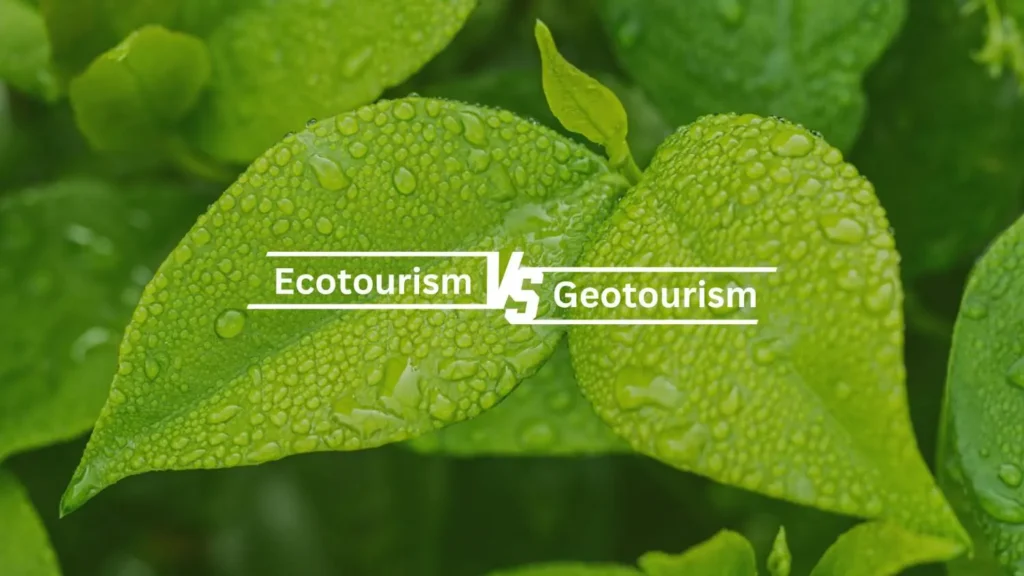
Definition of Ecotourism
Ecotourism is a form of sustainable travel that focuses on responsible exploration of natural environments while conserving the environment and improving the well-being of local communities. It combines conservation, education, and cultural sensitivity, allowing travelers to experience and appreciate the natural world without harming it.
Definition of Geotourism
Geotourism provides an immersive way to explore Earth’s natural beauty and cultural richness, offering a meaningful travel experience that educates and inspires, while supporting sustainable development and conservation efforts. Like ecotourism, geotourism advocates for the protection of natural environments. It encourages practices that preserve delicate ecosystems and minimize the environmental impact of tourism.
Comparison
| Aspect | Ecotourism | Geotourism |
|---|---|---|
| Primary Focus | Natural ecosystems, wildlife, and cultural heritage | Geological features, landscapes, and cultural heritage |
| Key Activities | Wildlife observation, nature hikes, cultural exchanges | Exploring geological sites, learning about earth sciences |
| Cultural Interaction | Strong emphasis on interacting with and supporting local communities | Emphasizes how geology shapes local culture and history |
| Environmental Impact | Low-impact travel with a focus on sustainability | Also emphasizes sustainability, particularly in geological conservation |
| Educational Aspect | Educates about environmental conservation and cultural preservation | Educates about geology, earth sciences, and their impact on human societies |
The key principles of Ecotourism include:
- Minimizing negative impacts on the environment and local culture
- Building environmental and cultural awareness and respect
- Providing positive experiences for both visitors and hosts
- Generating direct financial benefits for conservation and local communities
- Delivering memorable interpretative experiences to visitors
Key aspects of Geotourism include:
- Sustaining and enhancing the geographical character of a place
- Focusing on the environment, culture, aesthetics, heritage, and well-being of residents
- Assimilating with rural tourism or agrotourism
- Targeting geotourism destinations
Environmental Impact of Ecotourism and Geotourism
Negative Impacts:
- Habitat Destruction: Construction of facilities and infrastructure can lead to habitat loss and fragmentation, particularly in sensitive ecosystems like forests and wetlands.
- Wildlife Disturbance: Increased human presence can stress wildlife, leading to behavioral changes and potential declines in populations.
- Pollution: Tourism activities can result in air, water, and soil pollution, especially from waste generated by tourists and tourism operations
Positive Impacts:
- Conservation Funding: Ecotourism can provide financial resources for conservation efforts, helping to protect natural areas and wildlife.
- Environmental Awareness: It promotes education and awareness about environmental issues among tourists and local communities, fostering a conservation mindset.
Environmental Impacts of Geotourism
Negative Impacts:
- Land Transformation: Geotourism activities, such as rock climbing and hiking, can lead to soil erosion and degradation of geological features due to overuse.
- Resource Depletion: Increased visitor numbers can strain local resources, including water and land, leading to potential conflicts with local communities.
- Pollution and Waste: Similar to ecotourism, geotourism can contribute to pollution, particularly in areas with inadequate waste management systems.
Positive Impacts:
- Geoconservation: Geotourism can promote the conservation of geological sites and landscapes, enhancing awareness and appreciation for geodiversity.
- Community Involvement: It often involves local communities in tourism management, providing them with economic benefits and a stake in preserving their natural heritage.
| Aspect | Ecotourism | Geotourism |
|---|---|---|
| Habitat Impact | Can lead to habitat destruction and wildlife stress | Can cause soil erosion and degradation of geological features |
| Pollution | Contributes to air, water, and soil pollution | Similar pollution issues, especially with waste management |
| Conservation | Provides funding and awareness for conservation efforts | Promotes geoconservation and appreciation of geological heritage |
| Community Benefits | Supports local economies through conservation | Involves local communities in tourism management and benefits |
Successful Ecotourism and Geotourism Projects
Ecotourism Projects
Gili Lankanfushi, Maldives: Coral Line Project
This project aims to protect and regenerate coral reefs, which are vital ecosystems. The initiative involves guests in hands-on coral restoration activities, contributing to scientific research and local environmental projects. Gili Lankanfushi has become a model for sustainable resort practices, sharing knowledge with other resorts to promote coral conservation.
Inkaterra, Peru
Established in 1975, Inkaterra operates eco-friendly lodges in key natural areas, including the Amazon rainforest and Machu Picchu. Their non-profit, Inkaterra Asociación, focuses on conserving Peru’s biodiversity and cultural heritage while promoting sustainable tourism practices. The organization also engages in community development, ensuring that local populations benefit from tourism.
Geotourism Projects
Geoparks in Poland
Poland has developed several UNESCO geoparks that focus on geological heritage and education. These parks offer guided tours, educational workshops, and geo-routes that highlight the unique geological features of the region. They support local economies by creating jobs in tourism and conservation while promoting sustainable practices.
Prządki Nature Reserve, Poland
This nature reserve utilizes its geotourism potential by offering educational opportunities that focus on the region’s geological and cultural heritage. The reserve promotes eco-educational activities that attract visitors interested in geology and conservation, thereby enhancing local tourism while protecting natural resources.
Conclusion
Both ecotourism and geotourism offer enriching travel experiences with a strong emphasis on sustainability and conservation. While ecotourism is more focused on biological and cultural diversity, geotourism centers on geological features and their influence on human culture. Travelers interested in understanding the earth’s natural processes and their impact on the environment and human history would find geotourism particularly rewarding, while those passionate about preserving ecosystems and wildlife might prefer ecotourism.